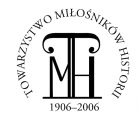Jan Karol Kochanowski (1869-1949)

Medievalist, historiosopher, sociologist, first editor-in-chief of Przegląd Historyczny (1905–1916). He was born into a landowning family, in the village of Rożenek near Opoczno, and attended schools in Kielce and Piotrków Trybunalski. He studied history at the Jagiellonian University (1888–1892) and the University of Wrocław (1892–1894). In 1895 he settled in Warsaw; in that same year he married Maria Kamieniecka, sister of the historian Witold Kamieniecki. In 1900 he became a member of the Józef Mianowski’s Fund Committee in Warsaw. He was one of the founders of Przegląd Historyczny (1905), the Friends of History Society (1906) and the Warsaw Scientific Society (1907), which he presided over from 1918 to 1925. He taught at Jan Miłkowski’s Pedagogical Courses for Women. After handing over the post of editor-in-chief, he continued to be associated with the journal as a member of the Editorial Committee (1917–1939). In 1919 he took over the chair of Polish history of the Middle Ages and auxiliary sciences of history at the University of Warsaw, of which he soon became rector (1920–1921). From 1921 until 1935 he presided over the chapter of the Order of Polonia Restituta, and was also a member of parliament, representing the Non-partisan Bloc for Cooperation with the Government (1928–1930). During the war he moved to Widawka near Radomsk. He died in Cielądz on 9 October 1949.
His most important publications include Kazimierz Wielki — zarys żywota i panowania (Warsaw 1899), Witold, Wielki Książę Litewski (Lviv 1900), O heraldyce czyli o znajomości herbownictwa (1902), Echa prawieku i błyskawice praw dziejowych na tle teraźniejszości (Warsaw 1910), Nad Renem i nad Wisłą, antyteza dziejowa (Warsaw 1913), Postęp ludzkości jako wyraz praw psychicznych rozwoju (Warsaw-Lviv 1917), Codex diplomaticus nec non commemorationum Masoviae generalis (Warsaw 1919–publisher), Partykularyzm a wielkie idee dziejowe Polski średniowiecznej (Warsaw 1930).

